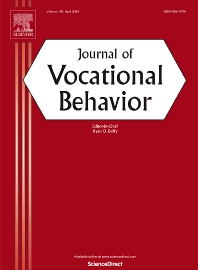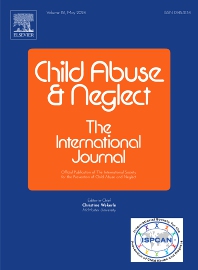Journals in Developmental and educational psychology
Journals in Developmental and educational psychology
Research in Developmental Disabilities
Research In Developmental Disabilities is an international journal aimed at publishing original research of an interdisciplinary nature that has a direct bearing on the understanding or remediation of problems associated with developmental disabilities. Articles will be primarily empirical studies, although an occasional position paper or review will be accepted. The aim of the journal will be to publish articles on all aspects of developmental difficulties using rigourous research methods. Our aim is to publish the best available and most current research possible.- ISSN: 0891-4222

Journal of Vocational Behavior
The Journal of Vocational Behavior publishes original empirical and theoretical articles that contribute novel insights to the fields of career choice, career development, and work adjustment across the lifespan and which are also valuable for applications in counseling and career development programs in colleges and universities, business and industry, government, and the military.The Journal primarily focuses on investigations of individual decision-making about work and careers rather than studies of employer or organizational-level variables. Example topics include initial career choices (e.g., choice of major, initial choice of work or organization, organizational attraction), the development of a career, work transitions, work-family management, work adjustment and attitudes within the workplace (such as work commitment, multiple role management, turnover).Editors will consider manuscripts that make significant contributions to the literature in the following areas: Studies of individuals' career and work-related choices examining topics such as: • Theories of career choice; occupational interests and their measurement • The inter-relation of abilities, needs, values, and personality • Occupational aspirations and the vocational decision-making process • Career adaptability; vocational development processes and stages • The effects of culture, demographic variables, and experiential factors on vocational choice • Career exploration • Job search • Organizational socialization. Stud... of work decisions and adjustment within the workplace, investigating topics such as: • Job performance and satisfaction • Career success; • Theories of work adjustment • Adult vocational development and career patterns • Organizational commitment and job involvement • Multiple-role management and the work-family interface • Work-role salience • Culture, demographic variables, and experiential factors on workplace decisions • Work-leisure relations • Midlife career change • Occupational re-entry and transition from work to retirement. • Individual job characteristics and job design. • Work-related stress and well-being. The journal also publishes research on career interventions; mentoring; and psychometric research that reports the construction and initial validation of new inventories as well as studies that evaluate the reliability and validity of instruments that measure career related constructs. Please note: the Journal does not publish research on organization-, team-, or group-level variables nor does it publish studies on vocational education.- ISSN: 0001-8791

International Journal of Child-Computer Interaction
The International Journal of Child-Computer Interaction serves as a forum to communicate original, high-quality research in child-computer interaction and interaction design and children. IJCCI employs a double-blind review process, utilizing a minimum of two (2) referees. The journal welcomes contributions on the following topics:• New methods for working with children in design, evaluation and research; • Models that help designers and researchers better understand children and their relationships with technology; • Interaction design cases that demonstrate novel and well designed technologies for children; • Studies of how children interact with and through technology; • Research about the use of, and the design of, technologies for play, learning, sociality and communication; • Reviews of the literature, theories around child development and technology design; • Studies of gaming and the application of serious games theories to children's technologies; • Evaluation studies of new and emerging technologies designed for children.- ISSN: 2212-8689

Research in Autism
Research in Autism (REIA) publishes high quality empirical articles and reviews that contribute to a better understanding of Autism Spectrum Disorders (ASD) at all levels of description; genetic, neurobiological, cognitive, and behavioral. The primary focus of the journal is to bridge the gap between basic research at these levels, and the practical questions and difficulties that are faced by autistic individuals and their families, as well as carers, educators and clinicians. In addition, the journal encourages submissions on topics that remain under-researched in the field. We know shamefully little about the causes and consequences of the significant language and general intellectual impairments that are very common among the autism community. Even less is known about the challenges that autistic women face and less still about the needs of autistic individuals as they grow older. Medical and psychological co-morbidities and the complications they bring with them for the diagnosis and treatment of ASD represents another area of relatively little research. REIA is committed to promoting high-quality and rigorous research on all of these issues.- ISSN: 1750-9467

Journal of Nutrition Education and Behavior
Official Publication of Society for Nutrition Education and BehaviorThe Journal of Nutrition Education and Behavior (JNEB), the official peer-reviewed journal of the Society for Nutrition Education and Behavior, since 1969, serves as a global resource to advance nutrition education and behavior related research, practice, and policy. JNEB publishes original research, as well as papers focused on emerging issues, policies and practices broadly related to nutrition education and behavior. These topics include, but are not limited to, nutrition education interventions; theoretical interpretation of behavior; epidemiology of nutrition and health; food systems; food assistance programs; nutrition and behavior assessment; and public health nutrition. Strategies to implement nutrition education, such as policy, systems, and environmental approaches or technological advances are also considered. Skill development within interventions, such as food procurement and culinary expertise; physical activity partnered with nutrition education; and strategies to reduce food insecurity are valued.In addition to Research Articles and Briefs, JNEB accepts Intervention Methods, Questionnaire Development Methods, Perspectives, Reports, Meta-analysis and Systematic Reviews, and GEMS (Great Educational Materials that have an evaluative component). Reviews of Educational Materials are invited. JNEB encourages data sharing to enhance scientific integrity. The procedure for submitting possible topics for position papers of SNEB can be found at https://www.jneb.org... and calls for papers related to specific themed issues are also available at https://www.jneb.org...- ISSN: 1499-4046

Research in Autism
Research in Autism (REIA) publishes high quality empirical articles and reviews that contribute to a better understanding of Autism Spectrum Disorders (ASD) at all levels of description; genetic, neurobiological, cognitive, and behavioral. The primary focus of the journal is to bridge the gap between basic research at these levels, and the practical questions and difficulties that are faced by autistic individuals and their families, as well as carers, educators and clinicians. In addition, the journal encourages submissions on topics that remain under-researched in the field. We know shamefully little about the causes and consequences of the significant language and general intellectual impairments that are very common among the autism community. Even less is known about the challenges that autistic women face and less still about the needs of autistic individuals as they grow older. Medical and psychological co-morbidities and the complications they bring with them for the diagnosis and treatment of ASD represents another area of relatively little research. REIA is committed to promoting high-quality and rigorous research on all of these issues.- ISSN: 3050-6565

Developmental Review
Developmental Review: Perspectives in Behavior and Cognition publishes authoritative, integrative, and innovative reviews and theoretical syntheses that advance understanding of human development across the lifespan. Serving researchers, educators, clinicians, and policy makers, the journal provides a leading forum for conceptual and theoretical advances in developmental psychology, welcoming contributions that address the mechanisms and processes underlying development from infancy through aging. We encourage submissions that highlight conceptual innovation, clarify or challenge current thinking, and offer new directions for research. Interdisciplinary work that bridges developmental psychology with fields such as neuroscience, cognitive science, education, health, pediatrics, psychiatry, and policy is particularly welcome. Topics of interest include conceptual and theoretical work on cognitive, social, and emotional development; language and communication development; moral and ethical development; identity and self-concept development; motivation and learning in development; developmental psychopathology; neurodevelopmental processes; aging and lifespan development; cultural and contextual influences on development; genetics and epigenetics in development; decision-making and reasoning development; educational and applied developmental science; methodological and statistical advances in developmental research; and interventions and policy implications.- ISSN: 0273-2297

Journal of School Psychology
The Journal of the Society for the Study of School Psychology (SSSP)The Journal of School Psychology (JSP) publishes original empirical articles and critical reviews of the literature on research and practices relevant to school settings across the full range of methodologies that address culture, context, and quality standards (e.g., race, ethnicity, and culture; qualitative, quantitative). JSP presents research that advances the science and practice of school psychology on intervention mechanisms and approaches; prevention and implementation; schooling effects on the development of social, cognitive, mental health, academic, and achievement outcomes; assessment; consultation; and social justice as a process and outcome. JSP emphasizes strengths-based perspectives of populations, multiple and interconnected ecologies (e.g., home, school, community) within which children learn and develop, research that actively and authentically involves school professionals, families, and community members; integration of critical theories; and author positionality in research. JSP focuses on writing that is inclusive and empowering, equity-centered, and anti-racist. Research conducted within and across countries throughout the world is welcome.The Editorial office of JSP may be contacted at: Andy Garbacz, University of Wisconsin-Madison, Department of Educational Psychology, Madison, Wisconsin, United States of American, 53706. Email: [email protected]...- ISSN: 0022-4405

Child Abuse & Neglect
Official Publication of the International Society for Prevention of Child Abuse and NeglectChild Abuse & Neglect is an international and interdisciplinary journal publishing articles on child welfare, health, humanitarian aid, justice, mental health, public health and social service systems. The journal recognizes that child protection is a global concern that continues to evolve. Accordingly, the journal is intended to be useful to scholars, policymakers, concerned citizens, advocates, and professional practitioners in countries that are diverse in wealth, culture, and the nature of their formal child protection system. Child Abuse & Neglect welcomes contributions grounded in the traditions of particular cultures and settings, as well as global perspectives. Article formats include empirical reports, theoretical and methodological reports and invited reviews.- ISSN: 0145-2134

Journal of Experimental Child Psychology
The Journal of Experimental Child Psychology is an excellent source of information concerning all aspects of the development of children. It includes empirical psychological research on cognitive, social/emotional, and physical development. In addition, the journal periodically publishes Special Topic issues.- ISSN: 0022-0965
